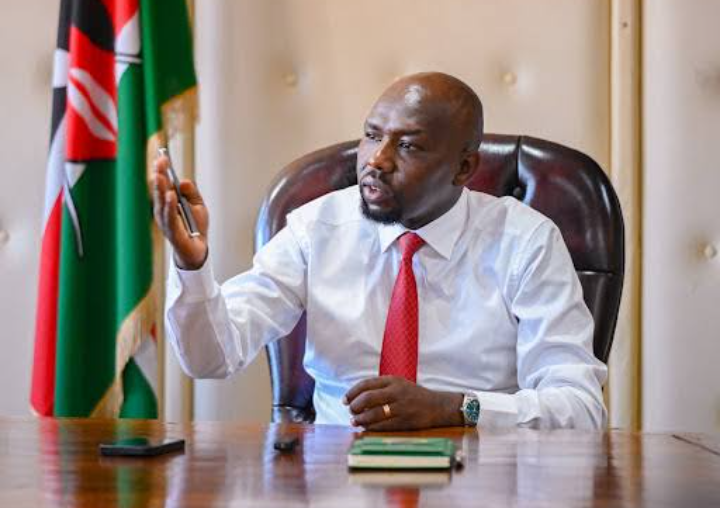The Ethics and Anti-Corruption Commission (EACC) has been Urged to investigate Sports Cabinet Secretary Kipchumba Murkomen, alongside Principal Secretary for Roads Eng. Joseph Mbugua, KeNHA’s top leadership, and Belgut MP Nelson Koech, following serious allegations of interference and favoritism in awarding contracts to rehabilitate critical Nairobi roads.
These influential figures are linked to two high-value contracts worth a combined Ksh 3.05 billion, issued by the Kenya National Highways Authority (KeNHA) to repair sections of Waiyaki Way, Uhuru Highway, and Mombasa Road, which sustained damage during the Nairobi Expressway’s construction.
However, questions about the legitimacy of the bidding process and the selection of contractors companies owned by family members of these officials have raised public concern and brought these high-ranking leaders under a cloud of suspicion.
One of the contracts, valued at Ksh 1.19 billion, was awarded to Shovels and Trowels, a company owned by Belgut MP Koech’s wife, Yvonne Chepkirui Kones.
Shovels and Trowels received the project to rehabilitate the segment from the James Gichuru Road junction to Ole Sereni Hotel on Mombasa Road.
The second contract, totaling Ksh 1.86 billion, was awarded to Wolf Paving Kenya, which is registered to Cynthia Wanjiru and Dennis Nyamu.
This company was assigned the section between Ole Sereni Hotel and Athi River.
However, an anonymous whistleblower’s letter sent to EACC CEO Twalib Mbarak in June 2023 alleged that neither Shovels and Trowels nor Wolf Paving Kenya met the technical requirements for these big infrastructure projects, calling into question how these firms won such valuable contracts.
According to the whistleblower, a senior KeNHA director, who served as chair of the tender evaluation committee, allegedly approved the bids under intense pressure from high-ranking officials, including then-Transport CS Murkomen, who has since moved to the Sports Ministry, and MP Koech.
The letter claimed that these companies were not the lowest bidders and should not have qualified.
It further alleged that a Ksh 25 million bribe was paid to a KeNHA director to influence the tendering process, steering the contracts toward Shovels and Trowels and Wolf Paving Kenya despite their lack of qualifications.
Since winning these contracts, both companies have faced backlash due to extensive project delays that are causing frustration and safety risks among Nairobi’s road users. KeNHA initially assured the public that the roadworks would conclude by April 25, 2024, but little progress has been made.
Wolf Paving Kenya has reportedly left substantial portions of Mombasa Road incomplete, including an exposed tunnel near the Airtel building that poses a major risk to motorists, especially at night.
The stretch from Waiyaki Way to Uhuru Highway remains partially rehabilitated, and residents and road users have voiced concerns that the two companies lack the necessary equipment and expertise to complete these complex, large-scale projects on schedule.
Amid growing public dissatisfaction, the EACC has confirmed receipt of the whistleblower’s complaint but has not yet announced any formal investigation.
The mounting delays and safety hazards along these critical transport corridors have only heightened public calls for the EACC to expedite its probe.
Many citizens are urging for greater accountability from high-ranking officials like Murkomen and Koech, given that such projects are funded with taxpayer money and involve public infrastructure that directly affects millions of people.
The revelation of Murkomen and Mbugua’s alleged involvement has ignited significant debate about the transparency and integrity of Kenya’s procurement systems.
The awarding of over Ksh 3 billion in contracts to companies with suspected conflicts of interest and questionable qualifications has cast doubt on the government’s commitment to upholding anti-corruption standards.
Public anger has been further inflamed by the fact that high-profile figures linked to the contracts have faced minimal consequences thus far, with the majority of responsibility resting on the EACC to hold these officials accountable.
For Murkomen, Koech, Mbugua, and others entangled in this emerging scandal, the controversy presents a critical test of the government’s willingness to address corruption and mismanagement, especially when it involves influential individuals.
While the road rehabilitation projects remain incomplete, the very officials implicated are perceived to have continued their work without significant repercussions.
This situation has left many Kenyans questioning whether any real accountability exists within the nation’s procurement system, and if the EACC will succeed in its mission to root out corruption among the powerful.
As the EACC faces heightened calls for swift and decisive action, this case underscores the importance of transparency in public projects, particularly those affecting infrastructure on which millions of people rely daily.
Nairobi’s residents are watching closely, hoping that the commission will deliver a thorough investigation and hold those responsible to account.
The allegations surrounding these contracts mark a pivotal moment for Kenya’s anti-corruption efforts, especially in regard to the conduct of public officials in critical government positions.





















Add Comment